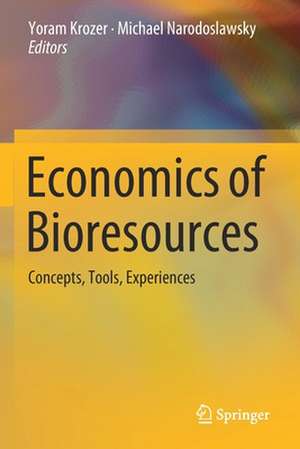Economics of Bioresources: Concepts, Tools, Experiences
Editat de Yoram Krozer, Michael Narodoslawskyen Limba Engleză Paperback – 8 iul 2020
Written by a team of scholars and practitioners from various engineering, natural-science and social-science disciplines, the book is primarily intended for undergraduate and graduate students, and for practitioners in business and policy who wish to explore the sustainable production and use of bioresources. All theoretical issues are explained with the aid of real-world examples, making the content highly accessible.
| Toate formatele și edițiile | Preț | Express |
|---|---|---|
| Paperback (1) | 383.93 lei 6-8 săpt. | |
| Springer International Publishing – 8 iul 2020 | 383.93 lei 6-8 săpt. | |
| Hardback (1) | 301.81 lei 3-5 săpt. | +26.77 lei 7-13 zile |
| Springer International Publishing – 23 mai 2019 | 301.81 lei 3-5 săpt. | +26.77 lei 7-13 zile |
Preț: 383.93 lei
Nou
Puncte Express: 576
Preț estimativ în valută:
73.46€ • 76.70$ • 60.80£
73.46€ • 76.70$ • 60.80£
Carte tipărită la comandă
Livrare economică 04-18 aprilie
Preluare comenzi: 021 569.72.76
Specificații
ISBN-13: 9783030146207
ISBN-10: 3030146200
Pagini: 210
Ilustrații: XI, 210 p. 17 illus., 10 illus. in color.
Dimensiuni: 155 x 235 mm
Greutate: 0.32 kg
Ediția:1st ed. 2019
Editura: Springer International Publishing
Colecția Springer
Locul publicării:Cham, Switzerland
ISBN-10: 3030146200
Pagini: 210
Ilustrații: XI, 210 p. 17 illus., 10 illus. in color.
Dimensiuni: 155 x 235 mm
Greutate: 0.32 kg
Ediția:1st ed. 2019
Editura: Springer International Publishing
Colecția Springer
Locul publicării:Cham, Switzerland
Cuprins
1.Introduction: Yoram Krozer, Maarten Arentsen, Michael Narodoslawsky (10 pages).- Part I: Basics (20-25 pages each chapter).- 2.Bioresources basics: Michael Narodoslawsky.- 3.Bioresources for electricity: Andrej Gubina.- 4.Economic basics: Yoram Krozer.- 5.Regional capabilities: Frans Coenen.- 6.Market behavior: Boglarka Vajda and Yoram Krozer.- 7.Business development: Yoram Krozer and Petra Doelman.- 8.Policy development: Maarten Arentsen .- Part II Cases (5-10 pages each chapter).- 9.Willows for localized fuels: Sandor Bartha.- 10.Modern bio-refineries: Louis Duarte.- 11.Supplies for bioenergy markets: Devrim Yazan.- 12.Food chain waste processing: Ina Körner.- 13.Reuse of edible oils: Avinash Narayanswamy.- 14.Manure for energy: Willem van Laarhoven.
Notă biografică
Yoram Krozer holds an M.Sc. in Biology and Ph.D. in Economics, and has worked in the business sector and various non-governmental organisations. After thirty years in the private sector he joined the University of Twente as director of the Cartesius Institute, Institute for Sustainable Innovations of the Netherlands Technical University. He currently teaches on the economics of sustainable development as an associated professor at the University of Twente, where he directs the Sustainable Innovations Academy.
Michael Narodoslawsky completed his Ph.D. in Chemical Engineering at Graz University of Technology. Until retirement in 2016 he headed the research group Process Synthesis, Process Evaluation and Regional Development at the Technical University of Graz, as well as the European Commission’s Working Group on Bioenergy. Currently, he co-chairs the European Sustainable Energy Innovation Alliance (eseia) Working Group on Bioresources. His chief research interests are in ecological assessment and lifecycle analysis, regional technology networks and biorefineries.
Textul de pe ultima copertă
This fundamental book provides a cross-sectoral, multi-disciplinary view on the biobased economy. It explains opportunities for the value-adding production and use of bioresources, while also discussing the main drivers and obstacles involved. The book is divided into three major parts, the first of which introduces readers to the basics of bioresource economics and engineering. In terms of economics, it discusses decision-making from the policy, producer, investor, and citizen perspectives; in terms of engineering, it addresses key technologies and the processing of bioresources, as well as the development of biorefineries for high-value products on large and small scales. In turn, the book’s second part presents cases focused on different types of energy use, and written by practitioners. The cases illustrate the businesses and technologies involved, as well as the roles of citizens, social organisations and policies. The book’s third and last part highlights opportunities in sustainable agriculture, valuable industrial products and innovative services, while also outlining key conditions for success.
Written by a team of scholars and practitioners from various engineering, natural-science and social-science disciplines, the book is primarily intended for undergraduate and graduate students, and for practitioners in business and policy who wish to explore the sustainable production and use of bioresources. All theoretical issues are explained with the aid of real-world examples, making the content highly accessible.
Caracteristici
Offers a thorough review of bioresource economics, including both engineering and economics aspects Explores key issues in the sustainable production and use of bioresources Presents case studies on the successful introduction of bioresources Outlines business opportunities in the biobased economy
